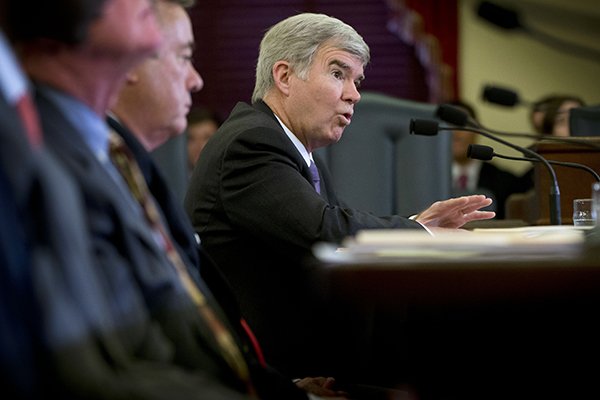FAYETTEVILLE -- Al Witte knows the NCAA, and he knows law.
Based on that knowledge he foresees tough sledding ahead on a variety of issues for the NCAA. Deservedly so, Witte says.
A not yet retired law professor of 57 years, Witte, 90, still teaches a seminar on law and literature at the University of Arkansas.
Witte served for decades as the UA's faculty representative to the NCAA. He had the title of NCAA president from 1989-91, a ceremonial title, Witte said, noting the NCAA executive directors were in charge.
Had he been allowed to dictate, some of what Witte calls "the insanity that's always been a part of the NCAA" would not have run so rampant so long.
Witte's favorite example of "the insanity" occurred during an NCAA Council meeting he attended.
"There was an appeal on two boys who had graduated from high school at Boston Latin," Witte said.
Boston Latin, established in 1635 and attended by Benjamin Franklin, is our country's oldest high school and still considered among the best.
"These two graduates did not have algebra on their high school transcript," Witte said. "So they were declared ineligible academically. Algebra was not on their high school resume because they had taken it in the eighth grade and they both got A's. But the rule says you have to have algebra on your high school transcript, and they [the NCAA] say, 'We can't make an exception.' All the while I am going nuts. This is insanity.
"I hope it's better now."
Witte said it is academically, crediting the NCAA for discarding some of its criticized academic entrance policies of the 1980s and "establishing workable standards" aimed at athletes achieving their degree in five years.
Beyond academics, Witte offers the NCAA few kudos.
"The one class of persons that was routinely treated in a restricted manner were the athletes," Witte said. "They weren't represented by any meaningful advocates. The financial ends of the universities were given preference over the benefits to the students routinely."
The NCAA could pay dearly for all that now on a variety of legal fronts while its five power conferences formulate plans to increase scholarship compensation.
Regarding the lawsuit waged by former UCLA basketball player Ed O'Bannon that contends college athletes deserve a financial cut from their likenesses from which colleges have profited, Witte said: "There is merit in the idea it is wrong to use somebody else's likeness for your own gain and not compensate them in some measurable form. I hope the plaintiffs win."
Also count Witte among the increasing number of people clamoring for college athletes to receive long-term health care for their collegiate sports injuries.
"Many of them need long-term care which they are not getting," Witte said. "So far as I know, no university is currently permitted to provide long-term care for injuries suffered while an athlete. I think that's behind the lawsuit to form a union of Northwestern [University] athletes.
"I am skeptical of unionizing students, but I do believe they have a strong, strong position that should be looked at favorably. It's about time the pendulum swung."
Sports on 07/19/2014
